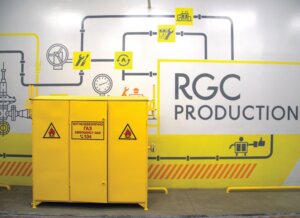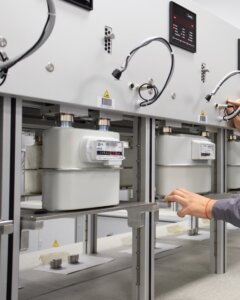The ongoing coronavirus epidemic around the world has plunged many businesses into a protracted crisis. This crisis has been exacerbated by uncertainty. It often paralyzes the efforts of the management of the businesses around the globe, bringing the effectiveness of forecasting the situation and strategy development to naught.
As you may know from the history of global crises, these turbulent times can either lead to collapse or open up new opportunities for individual businesses and entire industries. Being optimistic, we consider uncertainty as a challenge. We see in it new opportunities for innovative solutions.
Lockdown and protracted quarantine have become productive times for us. During this time, a number of decisions were made. The most important thing is that we continue to invest in our production projects.
Our RGC Production plant in Lviv witnesses how young, ambitious and talented people can bring their ideas to life. In fact, a corporate educational project materialized into a new robotic production of modern equipment for gas networks.

RGC Production
Over the past year and a half since it has been launched, we can safely say that this project has succeeded. At the moment, RGC Production is running at full capacity, and the world’s best manufacturers have become its suppliers. This is the result of being open to the world when you are not afraid of proposing and implementing new ideas.
We at RGC believe that uncertainty is not an obstacle to innovation. Our specialists stand ready to scale the success of the RGC Production case throughout the country. Already at the beginning of 2021, a similar innovative plant should be launched in Dnipro and then in Vinnytsia. Both new automated plants will supply modern gas equipment for the modernization of gas distribution networks throughout Ukraine.

Example of the product RGC Production plant
In the gas distribution industry, safety and reliability are as important as measurement accuracy. It narrows down the uncertainty. In terms of precision, watchmakers and diamond cutters usually come to mind. For centuries, they have remained a closed caste of artisans thanks to micron precision and painstaking handwork. There is a quarter in Antwerp where in workshops they have been mastering the secrets of cutting diamonds by hand for generations.
However, sophisticated technologies have reached this caste of the elite and are gradually squeezing out manual labor. Look how in watchmaking, automatic assembly lines have made watches affordable to everyone. Gas metering also requires pinpoint precision. You cannot do without high technologies here.
In Ukraine, up to a million metering devices are regularly verified every year. It takes a long time, is expensive and impractical to do it on the outdated stands. We have long wanted to take the field of metrology from the state of a craft to a completely new and modern level.
To this end, this summer, during the quarantine, we have commenced the RGC Metrological Center in Kharkiv. It is the most modern enterprise in Ukraine for the verification of measuring equipment. It is the only enterprise in the Eastern Europe that operates according to the Smart Factory principles. The technological cycle of verification is taking place without direct human intervention.
The use of digital systems made it possible to accelerate all the main technological processes by a factor of five. All information from automatic stands is recorded in the database. The path of each meter here resembles the transportation of a parcel: soon consumers will be able to track the verification process at all stages, like a courier delivery.

The metrological center
The metrological center uses new technologies in servicing corporate clients. The line for industrial meters verification that operates here is unique for Ukraine. It allows us to verify the metering devices with a diameter of up to 300 mm and a capacity of up to 6,500 cubic meters per hour. At the moment, this is the only line in the country capable of verifying the meters for production companies and the transportation system operator (TSO). In order to minimize any uncertainty in this area, we began to establish four more similar metrological centers in Ukraine. We expect that they will fully meet the demand of gas distribution companies for this service.
It is worth mentioning that the coronavirus epidemic, which has swept the whole of Europe, overshadows the impending energy transformation on the entire continent. But even under these circumstances, the transformation potential remains and its development opens up great opportunities in the energy sector.
This year in Europe, up to 40% of the energy will be generated from the renewable sources. This is already one of the markers of the technological revolution in the energy sector. The feature of green energy is that its production does not coincide with the consumption curve, which brings the question of energy accumulation. Hydrogen looks like the most realistic alternative.
From a technological point of view, hydrogen transportation also has a number of open questions. You can also observe uncertainty here. However, we are the first among the Ukrainian energy companies that started to investigate the effects of hydrogen on the gas distribution system. Our company has built five special test sites in different regions of Ukraine. All of them are real models of operating networks.
After two or three years of testing on those sites, we expect to present a plan that will allow us to make the current infrastructure hydrogen-ready — ready for the transportation of hydrogen.

RGC the first Ukrainian energy company that started to investigate the effects of hydrogen on the gas distribution system
The use of hydrogen by consumers is a separate area of our study. We are looking for the answer to the question, what the safe concentration of hydrogen in a mixture with natural gas should be? We are working on these and other practical aspects in partnership with the leading scientific and research institutions of Ukraine.
The next challenge is to improve the operational efficiency of the entire gas distribution system. The gas distribution system existing in Ukraine was built during the Soviet times and was designed to use 120 bcm of gas annually. Today’s consumption is 25 bcm. Therefore, the system with such an excess of capacity requires a serious redesign.To get a full understanding of the situation, we have completed the creation of a digital model of gas distribution systems. It took us almost 7 years to develop it. Now we know exactly how the state of the networks changes, how ineffective they are and why. We clearly know what and how to change in the system and how to do it.
Our system redesign pilot projects with a payback period of up to 10 years show that you can go from small targets to large ones and it makes economic sense. At the same time, we are actively exchanging expertise with our European partners. Our company is a member of the leading European technical associations, which allows us to bring modern safety standards to the industry.
For RGC, the crisis and uncertainty became time for advanced innovations: accelerated digitalization, implementation of smart solutions, projects to improve the stability and security of energy delivery. No matter what the epidemic situation is, be it the natural gas, its blends with hydrogen or pure hydrogen, RGC will ensure reliability, safety and the implementation of new technologies to improve the efficiency of gas distribution.

